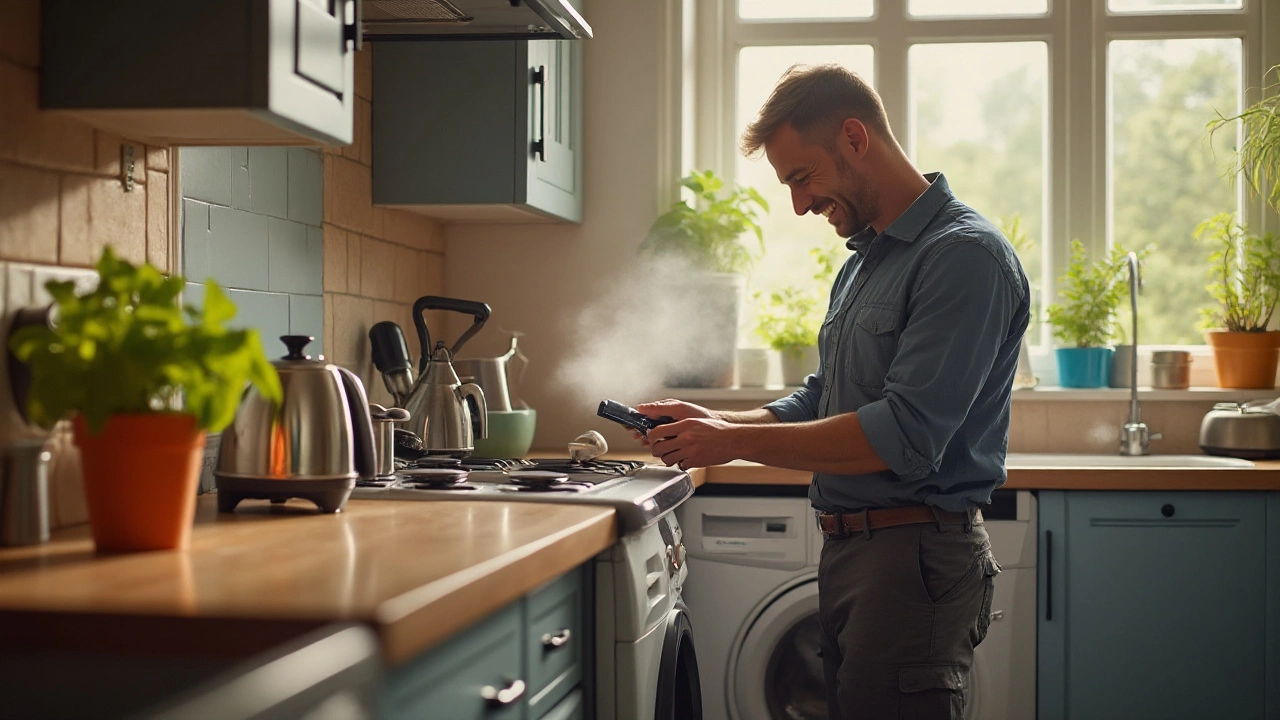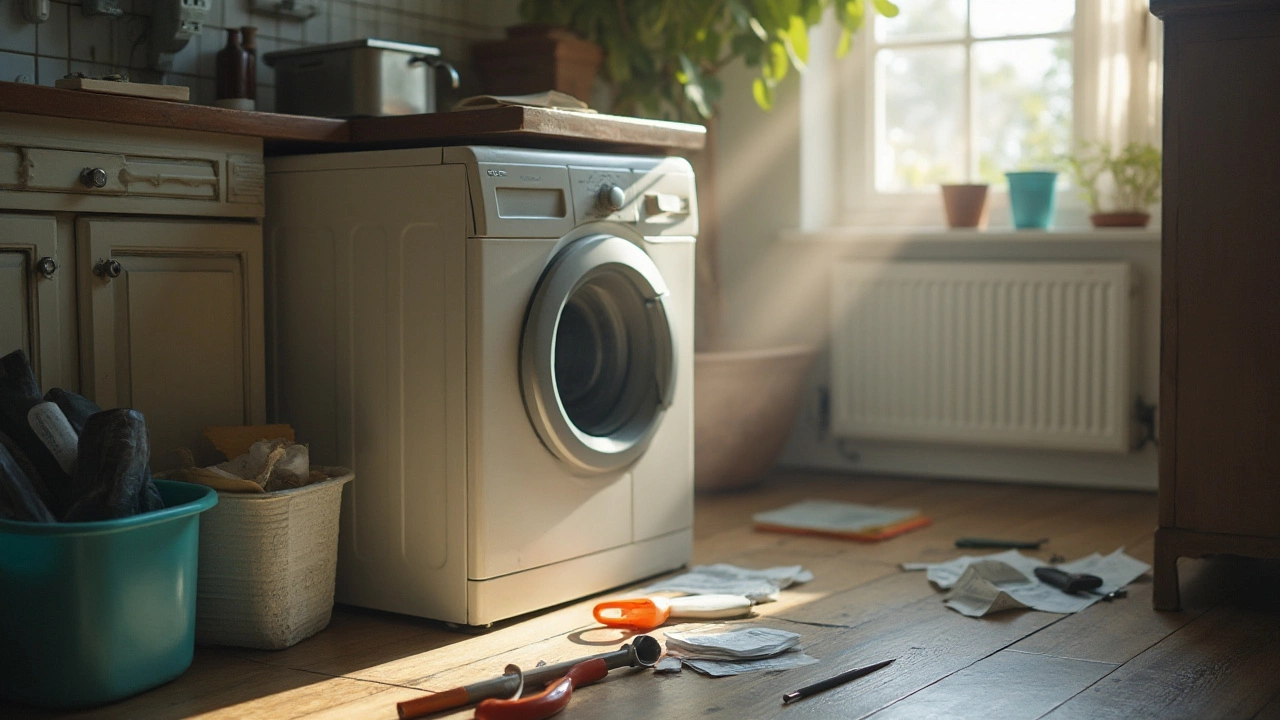
- 4 Dec 2024
- Gideon Thornton
- 0
Our homes are filled with appliances that quietly keep our lives running smoothly, from refrigerators keeping our food fresh to washing machines handling the weekly laundry load. But often, we only appreciate these hardworking machines when they break down or stop working efficiently.
Servicing appliances might seem like just another chore to add to an already busy schedule, but it pays off over time. A bit of regular maintenance can end up saving a lot of hassle and expense. In this guide, we'll delve into why maintaining your appliances is so important, how to spot when they need a bit of TLC, and tips on setting up a servicing routine to keep everything humming along nicely.
- The Importance of Regular Maintenance
- Signs Your Appliances Need Servicing
- DIY Maintenance Tips
- Benefits of Professional Servicing
- Common Misconceptions About Appliance Servicing
- Creating a Servicing Schedule
The Importance of Regular Maintenance
Regular maintenance of appliances is akin to routine checkups at the doctor—it can prevent larger, more costly issues down the road. For many homeowners, appliances often go unnoticed, operating silently behind the scenes. However, when these machines fail or underperform, the disruption to daily life can be significant. Routine upkeep not only extends the lifespan of your devices but also ensures they work more efficiently. By keeping components clean and in good condition, you ensure that your home electronics don't have to work as hard, thus consuming less energy, which in turn lowers utility bills.
Consistent care can preclude many problems. For example, cleaning refrigerator coils every six months prevents dust buildup, enabling the appliance to run smoothly. Similarly, clearing your dryer vent will not only improve drying efficiency but also significantly reduce the risk of household fires. These small tasks, often perceived as minor, cumulatively contribute to significant enhancements in the performance and longevity of appliances. It's been noted by experts that regular care can reduce energy consumption by 5% to 10% annually, a decent saving in the grand scheme of your household budget.
Professional opinions reinforce this approach. According to a study by the American Council for an Energy-Efficient Economy, regular servicing of air conditioners alone can improve performance efficiency by 15%. This statistic highlights not just the importance of maintenance but also the environmental benefits through reduced energy waste. Efficient appliances mean a lesser carbon footprint, and every small action contributes to a more sustainable home.
"Maintaining household appliances is not merely about preserving their life but ensuring peak efficiency and safety," notes Gary Snyder, a veteran appliance technician and author of "Home Appliance Mastery."
For those concerned about the cost of regular servicing, it's crucial to weigh it against potential repair expenses. Appliances like washing machines and dishwashers are complex, with intricate moving parts susceptible to wear and tear. A well-maintained machine typically experiences fewer breakdowns, lessening the likelihood of unexpected expenditure. Investing in regular maintenance allows you to foresee potential problems and address them before they escalate into major repairs or necessitate costly replacements.
Ultimately, setting a maintenance schedule doesn't require an overhaul of life routines. Most upkeep tasks can be integrated seamlessly into everyday life. Keeping an eye on performance, listening for unusual noises, and checking for leaks or signs of wear can tip off homeowners about impending issues. By taking maintenance seriously, you ultimately extend the life of your investment and promote peace of mind. After all, a home where appliances operate effortlessly is a more comfortable and stress-free space.
Signs Your Appliances Need Servicing
It's not always easy to tell when your household appliances need some professional attention. Since most of us aren’t appliance engineers, understanding the signs of trouble requires a little bit of observation and intuition. One of the most straightforward signs is a change in performance. If your refrigerator isn’t keeping food as cold as it used to, or your dryer is taking an unusually long time to dry clothes, you may have a problem on your hands. Often, these performance issues are subtle at first and easily ignored, but they can signal the need for an immediate check-up. It's best to act sooner rather than waiting for an appliance to fail completely, as this can sometimes cause further damage or more costly repairs.
Strange noises are another reliable indicator that things are amiss. Many home electronics make slight operational noises, but when they start sounding like a rock concert, it's time to act. For example, a banging noise from your washing machine might hint at an unbalanced drum, or worse, a failing motor. If left unaddressed, such issues can lead to substantial damage. Remember, ignoring these weird sounds can often transform a minor repair into a major overhaul.
Unusual odors often accompany appliance problems. If your oven emits a burnt smell even when empty, or the dishwasher holds a musty odor, it’s worth investigating. These smells could result from electrical issues or internal blockages, both of which are best tackled by professional servicing. Ignoring smells isn't just about poor performance, either – it can also be a matter of safety.
"An appliance's inability to properly heat or cool is often its way of telling you something isn't right," says Kim Thompson, home appliance expert. "Noticing the signs early and addressing them quickly can often prevent a complete breakdown."
Leaks and excessive energy use can also be telltale signs. Water under your refrigerator or pooling near your dishwasher isn’t just an inconvenience; it might mean seals are wearing, hoses are cracking, or internal parts are malfunctioning. Similarly, if you notice a spike in your utility bills without a corresponding increase in rates, an appliance might be working overtime to compensate for a failing part or inefficiency.
Finally, trust your instincts. If something feels off, it probably is. Our eyes and ears are some of the best tools we have in determining when appliances are in need of servicing. Even if you can’t pinpoint the exact issue, reaching out to a qualified appliance service company can save you time and prevent potential future headaches. A stitch in time truly does save nine when it comes to maintaining the efficiency and safety of household appliances.

DIY Maintenance Tips
Caring for our home electronics doesn't always require a degree in engineering; a bit of understanding and some regular attention can do wonders. Taking the preventative path can save not only time and money but also extend the life of appliances, allowing them to serve faithfully for years beyond expected lifespans. Regular workloads can cause wear and tear, but by implementing some easy maintenance tips, your appliances can enjoy productive lives. It’s quite fascinating how these small steps can considerably improve appliance efficiency. For example, cleaning the filters or coils of your refrigerator can enhance its energy efficacy by as much as 30%, which is a smart move for both the environment and your electricity bill.
Begin with one of the simplest, yet often overlooked tasks: cleaning. Dust and grime are invisible enemies that creep into your appliance's inner workings, causing friction and inefficiency. Take your washing machine as a prime example. Running an empty cycle with hot water and a cup of vinegar can help eliminate buildup inside and beneath fittings and seals. This prevents the musky odor that sometimes clings to laundry, ensuring clothes remain fresh and clean. Always check the appliance manual for specific instructions tailored to your model. Giving attention to small components like this can prevent bigger issues down the line, making cleaning an essential factor in appliance maintenance.
A study by the U.S. Department of Energy highlights that regular maintenance can reduce an appliance's energy consumption by up to 40%.
Brushing off those dusty coils at the back of your fridge is another easy win. It's an often missed task, yet so crucial. The coils play a vital role in ensuring optimal performance by releasing heat. If dust accumulates, the heat has nowhere to escape, leading your refrigerator to use more energy to maintain cool temperatures. All you need is a gentle vacuum. This avoids overworking the motor and keeps electricity costs down. Additionally, maintaining the correct gap between the fridge and walls can further prevent these issues, offering a pocket-friendly appliance service solution to consider.
Turning attention to the humble oven, it’s essential to routinely calibrate its temperature. Ovens that deviate from set temperatures can lead to food under or over-specialists of the appliance world recommend placing an oven-safe thermometer inside to test accuracy and adjust settings. This ensures that roast dinners or baked goods turn out as intended without repeated attempts. By keeping seals and gaskets clean and tight, heat remains contained, which greatly aids in achieving your gastronomic goals and keeps your energy expenditure reasonable. This is another example where a quick DIY fix leads to significant, long-term benefits.
It's worthwhile to also talk about dishwasher care. Regularly inspecting and cleaning the filter can keep your dishes coming out spotless every time. Debris and leftover food can get trapped, blocking the water's flow and compromising efficiency. A rinse under hot water followed by a scrub with a brush can easily tackle these blockages. Moreover, running a cycle with a dishwasher cleaner once a month ensures everything remains in top function. These simple actions embody the essence of DIY maintenance, where a little upkeep leads to impressive results, optimizing function and minimizing service costs.
Lastly, let’s not forget the importance of dryer lint traps. After each cycle, clearing out lint may seem a small task, yet it has tremendous impact. It reduces fire risk and improves dryer efficiency, thus promoting faster drying time and saving energy significantly. For a more thorough clean, incorporate a vent brush to reach any stubborn remnants. These maintenance routines not only promote safety but breathe new life into aging appliances, emphasizing the undeniable value of a hands-on approach to appliance care. In doing so, you’re taking a proactive step to ward off potential service calls and extending a warm welcome to sustainable living.
Benefits of Professional Servicing
Choosing to have your household gadgets undergo professional servicing is akin to entrusting a beloved car to an experienced mechanic. Professionals bring technical expertise that goes beyond routine maintenance, identifying underlying issues that might not be apparent to the untrained eye. These experts are trained to spot emerging problems before they develop into costly repairs, saving both money and preventing future headaches. With their specialized tools and knowledge, they ensure your appliances operate at peak efficiency, often leading to lower utility bills and a reduced carbon footprint.
Another crucial aspect of seeking professional appliance service is access to authentic parts and spares. Whether it's a refrigerator or a washing machine, using genuine components is vital to maintaining the appliance's original functionality and longevity. Professionals often have partnerships with manufacturers, ensuring that any replaced parts are of high quality and compatible with the rest of the unit. This means the appliance remains reliable and functions like new long after the warranty period has ended.
Moreover, turning to experts for appliance service is not only about hardware but also about staying up-to-date with the latest in appliance maintenance technology. Technological advancements frequently introduce smarter ways to maintain and repair gadgets, which professionals are always abreast of. Whether it's new diagnostic tools that pinpoint issues faster or innovative solutions for energy conservation, a professional service team can provide up-to-date information and quality service. A study by Consumer Reports highlights that professional maintenance can increase the lifespan of major appliances by up to 20%, underscoring the value of such investments.
As renowned home expert Bob Vila once said, "Maintenance isn't merely about fixing what's broken—it's about preventing things from breaking in the first place." This sentiment captures the proactive nature of professional service and its role in ensuring peace of mind for homeowners.In addition, opting for regular professional check-ups is a safer choice for the household. Certain appliances, particularly ones concerning heating elements like stoves and heaters, can pose safety risks if not properly maintained. Professionals are trained to handle risky repairs, ensuring safety standards are adhered to throughout the maintenance process.
Finally, utilizing expert services also provides an unparalleled customer experience. Many professionals offer warranties or service guarantees, lending an extra layer of assurance that their work will stand the test of time. These service providers often educate customers on best practices for appliance care, empowering homeowners with the knowledge to keep gadgets in top shape between services. This holistic approach not only preserves the functionality and lifespan of appliances but also fosters informed users who can effectively manage their home technology.

Common Misconceptions About Appliance Servicing
When it comes to appliance maintenance, there are a lot of myths and misconceptions that can lead homeowners to avoid the very services that could keep their households running smoothly. One prevalent misunderstanding is the belief that as long as an appliance is working, it doesn’t need to be touched or serviced. This notion might be appealing due to the simplicity of a 'no news is good news' approach, but it's a risky gamble. Appliances, much like cars or other complex machines, have moving parts that undergo wear and tear over time. Neglecting regular servicing increases the likelihood of abrupt failures, which often lead to costly repairs or replacements.
Another common myth suggests that DIY maintenance is just as effective as professional service. While there’s much you can do to maintain your appliances, such as cleaning filters or checking for leaks, there are intricate components that require the expert eyes of a trained technician. They possess specialized knowledge and tools which can identify potential issues that might not be visible or obvious to the untrained eye. Relying solely on personal inspection can lead to missed signs of looming problems or inadequate fixes, possibly worsening the damage over time.
There’s also the fallacy that professional servicing is an overpriced luxury rather than a necessity. It's a common view held by those looking to save a few bucks, but skipping routine check-ups might lead to spending more in the long run. Effective appliance service helps improve efficiency, resulting in lower energy consumption and bills. Moreover, a well-maintained appliance is less likely to break down unexpectedly, averting the stress and expense of emergency repairs. According to a reputable industry survey, properly maintained refrigerators run up to 30% more efficiently than those neglected, showcasing the tangible benefits of regular servicing.
Sometimes, people believe that appliance warranties cover all types of breakdowns, overlooking the fine print which often states that warranties can be void if appliances are not maintained properly. Therefore, understanding the scope and limitations of your appliance warranties is crucial. Regular servicing might not only keep the appliances functioning effectively but also ensure that you remain eligible for warranty claims when needed.
"Appliances are like cars; they need regular maintenance to operate efficiently and last long," says Sophia Marquez, an industry expert from the renowned Home Appliance Service Institute. "Ignoring routine servicing is akin to running a car without oil, which might keep going for a while, but eventually, it leads to disastrous breakdowns."
Lastly, there is an idea that new appliances don’t require servicing until they’re a few years old. Many believe, 'if it's new, it must be problem-free.' However, initial servicing helps in setting the appliance running optimally from the start and catching manufacturing defects early. By establishing a maintenance routine right from the beginning, you ensure a longer lifespan and better performance from the get-go.
It's vital to dispel these misconceptions surrounding appliance service. Educating oneself about the genuine requirements of household devices enables proactive care, resulting in appliances that not only last longer but also run more efficiently, saving both energy and money.
Creating a Servicing Schedule
To ensure your home appliances are always in top shape, establishing a structured servicing schedule is key. This isn't about making life more difficult, but rather about adding a layer of organization that can preempt issues and save you from costly repairs in the future. It might sound daunting at first, but with a little investment of time, you can create a routine that safeguards your devices' longevity and efficiency. The first step is taking a good look at each appliance in your home and understanding its individual needs. Different gadgets have unique servicing requirements, based on their make, model, and frequency of use. You wouldn’t treat your refrigerator like your vacuum cleaner, after all. Research suggests that manufacturers often provide recommended servicing timelines specific to their products, which can be an excellent starting point.
Once you’re familiar with these timelines, it’s helpful to mark a calendar with reminders for these key servicing dates. But let's acknowledge reality: sometimes knowing when to perform these checks isn’t straightforward. As with car maintenance, listening to professionals can be invaluable. Scheduling regular professional evaluations can be a smart way to ensure everything adheres to best practices.
"Consistent maintenance checks extend the useful life of your appliances by an average of 30%," advises the Appliance Servicing Institute.So, consider penciling in a professional once every year or two, or as specified by the manufacturer's guidelines.
Besides professional check-ups, there are tasks you can comfortably handle yourself. Creating a checklist of monthly, quarterly, and yearly maintenance activities for your appliance maintenance routine can be a good way to break down the workload. Monthly tasks might include clearing out the vacuum canister and deep cleaning the oven. Quarterly, you may want to give your laundry machines a drum cleaning cycle or defrost the freezer. Annually, you might include a full inspection of electrical cords and checks for signs of wear and tear. Don’t fall into the trap of thinking maintenance is secondary; it can seriously impact your appliance’s lifespan and efficiency.
Visual aids, like a chart or table, could be handy for staying on top of this. A simple table pinned to your fridge, listing appliances and accompanying servicing dates, ensures that nothing slips through the cracks:
| Appliance | Monthly | Quarterly | Annually |
|---|---|---|---|
| Oven | Clean surfaces | Check seals | Inspect electric cords |
| Refrigerator | Check temperature settings | Defrost | Schedule professional inspection |
| Vacuum | Empty canister | Wash filter | Check belt replacements |
Being proactive helps avoid the dread of emergency repairs, which often come at the most inconvenient times. A structured servicing schedule paves the path toward trouble-free living and peace of mind. Appliance service is a little effort that goes a long way. As they say, "Prevention is better than cure,” so give your appliances the care they deserve, and they’ll repay you in reliability and performance for years to come.




